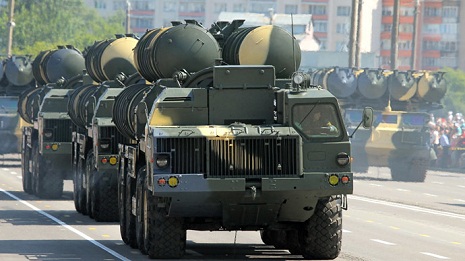The decree enters into force upon the president’s signature.
Russian Foreign Minister Sergey Lavrov commented on the decision, saying that Moscow’s voluntary embargo on S-300 deliveries was no longer necessary, due to the progress in Iran’s nuclear talks made in Lausanne on April 2.
During the talks in Switzerland, the P5+1 group have made “substantial progress in resolving the Iranian nuclear program,” Lavrov said. “The political framework of the final deal agreed upon was highly praised by the international community.”
He added: “We believe that at this stage there is no longer need for this kind of embargo - from the Russian side it was unilateral and voluntary.”
The foreign minister also said: “Meanwhile, a modern air defense system is now very relevant to Iran, especially taking into account the severe escalation of tensions in neighboring areas and especially the rapid development of military activity in Yemen in recent weeks.”
Lavrov added that the S-300 is an air defense missile system, which is of a purely defensive nature. It is not designed for attacks and “will not put at risk the security of any state in the region, including Israel," he said.
Iran’s defense minister said on Monday that Russia’s decision will boost cooperation with Moscow and could help regional stability.
US Secretary of State John Kerry raised concerns with Lavrov over Russia`s decision, White House spokesman Josh Earnest said on Monday. He added that Russia`s decision to start an oil-for-goods swap could also raise sanctions concerns.
Commenting on Russia’s move, US State Department spokeswoman Marie Harf said on Monday that US officials do not think this would affect the major powers’ unity in ongoing nuclear talks. She added that Russian deliveries of the S-300 would not violate Iranian sanctions imposed by the UN Security Council.
Israel has denounced Russia’s decision to lift the ban on providing S-300 missiles to Iran.
"This is a direct result of the legitimacy that Iran is receiving from the nuclear deal that is being prepared, and proof that the Iranian economic growth which follows the lifting of sanctions will be exploited for arming itself and not for the welfare of the Iranian people," Intelligence Minister Yuval Steinitz said in a statement on Monday.
The contract for supplying S-300 missile systems to Iran was signed in 2007 and implied the delivery of five S-300 squadrons worth $800 million. But in 2010 the contract was put on hold due to the UN imposing sanctions on Iran.
Tehran answered with filing a nearly $4 billion lawsuit against Russia’s Rosoboronexport arms dealer company to a Geneva arbitration tribunal.
The question of S-300 supply to Tehran remained unsettled for years.
After years of negotiation, in February 2015, Moscow offered Tehran the chance to buy its latest Antey-2500 anti-aircraft and ballistic missile system, instead of the older S-300 system. Iran replied that it would consider the offer.
The last time Russia supplied S-300 systems abroad was in 2010, when 15 squadrons were delivered to China.
Since then production of S-300 systems has been suspended as the main producer of the Russian air defenses, concern Almaz-Antey, has launched production of the next generation systems, S-400. China has become the first country allowed to buy S-400 systems, Rosoboronexport chief Anatoly Isaykin told the Russian media.
As of today, S-300 systems have been operable in a number of countries, including Algeria, Azerbaijan, Belarus, Cyprus, Kazakhstan and Vietnam. There is a valid contract to deliver S-300 systems to Syria, but it was put on hold after the beginning of the civil war in the country.
More about:
















































